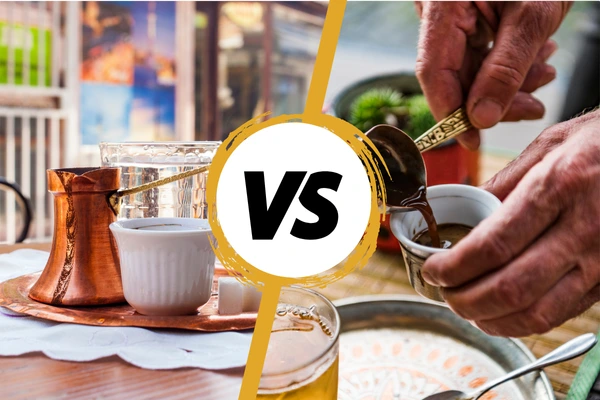Bosnian coffee vs Turkish coffee is a comparison that sparks plenty of debate, yet the truth is they are almost identical. Both are brewed the same way with finely ground Arabica. Both are simmered slowly in a pot. And both are enjoyed unfiltered with a rich layer of foam. So are there any differences?
Are Bosnian Coffee and Turkish Coffee the Same?
Yes, Bosnian coffee and Turkish coffee are essentially the same brew. Both use the same brewing method, similar tools, and even drinking habits are similar.
Some people like to argue that the difference is in the brewing tool. They’ll say Bosnian coffee uses a džezva while Turkish coffee uses a cezve. That sounds convincing until you look closer.
Difference Between Džezva and Cezve
These are simply two words for the same thing. The pot is always copper, with a narrow top and a long handle. The distinction comes from dialect, not design. In practice, the cezve and džezva are identical.
Difference in Coffee Beans
Where these two coffees differ is in their flavor. Both are brewed with 100% Arabica, but you won’t find the same packages on shelves in Sarajevo as you will in Istanbul.
Both countries have their local favorites. So yes, the taste can shift slightly.
Is Turkish Coffee Stronger Than Bosnian Coffee?
No, Turkish coffee and Bosnian coffee have the same strength and caffeine content. You can expect 50-65 mg of caffeine for both brews.
There is no difference in potency. Both are prepared with the same grind and the same water-to-coffee ratio.
Next up: Why Turkish coffee feels unique compared to others.
Are There Any Differences Between Bosnian Coffee and Turkish Coffee?
Yes, there is one small but noticeable difference in how they are served. Turkish coffee is usually brewed in small batches, often just a single cup at a time, with each cezve portioned carefully for one person.
Bosnian coffee, on the other hand, is often prepared in a larger džezva that can be shared across multiple sittings. It’s not unusual for the host to pour a little coffee into your cup, let you drink it, then refill it again from the same pot.
Origin of Bosnian Coffee
The similarities between Turkish coffee and Bosnian coffee are best understood when you look at the origin of Bosnian coffee.
It became popular in the Balkans during the time of the Ottoman Empire, which is how the brewing method and culture first arrived in the region. This shared history is another clear sign that the two styles are almost identical.
Do you want to know about one more similar brew and how one “spy” started Europe’s coffee culture in Vienna? Then make sure to check out a tale of Armenian coffee vs Turkish coffee.
Key Takeaways on Bosnian Coffee vs Turkish Coffee
At the end of the day, Bosnian coffee and Turkish coffee are more alike than different.
- Both follow the same brewing method with finely ground Arabica and a copper pot.
- The džezva and cezve are the same tool, just called by different names.
- Flavor shifts slightly because each country favors its own local coffee brands.
- Caffeine strength is identical, averaging 50-65 mg per cup.

